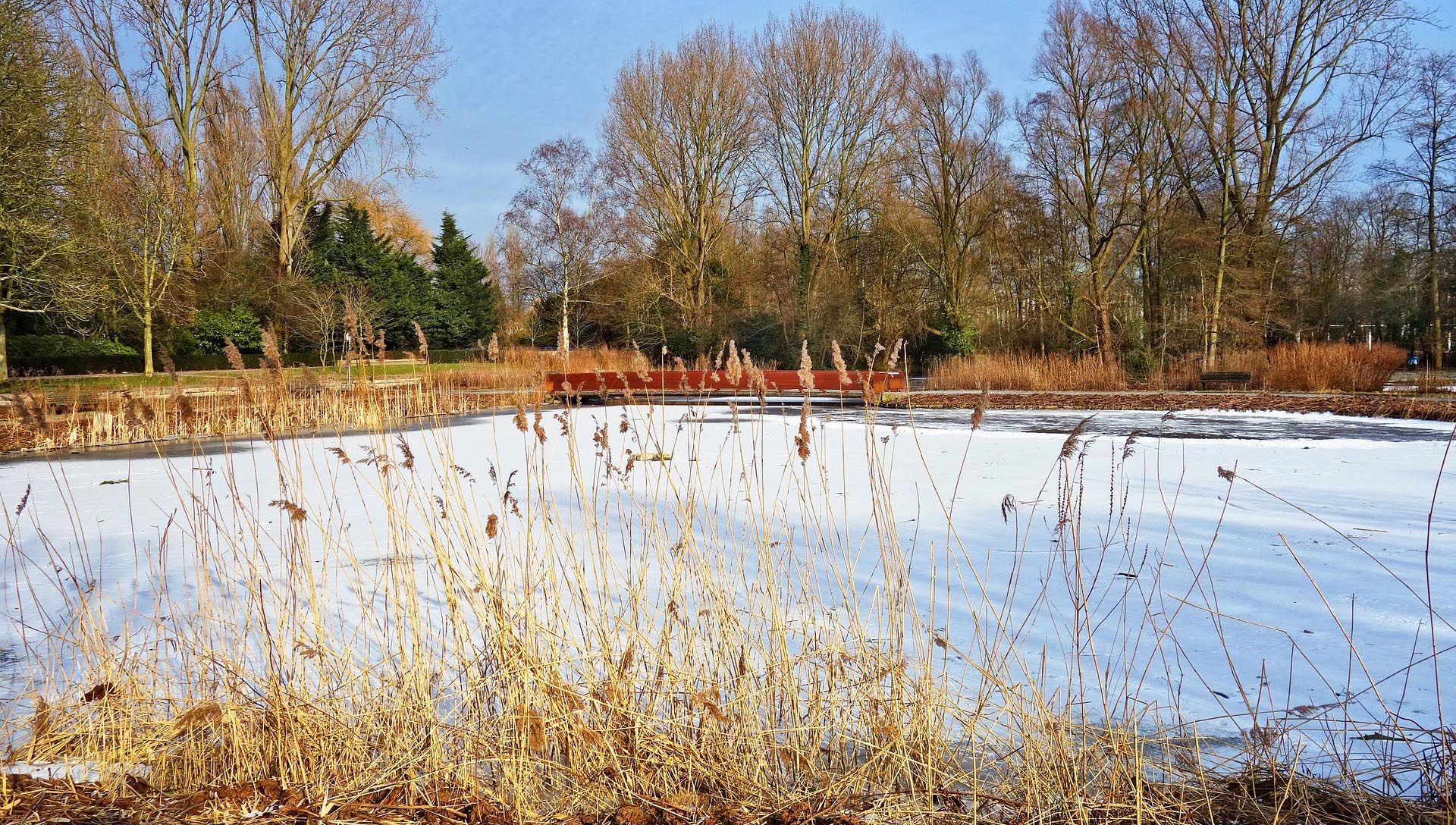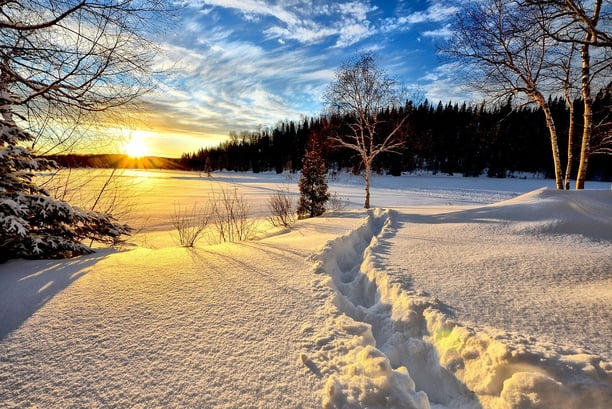
Can You Build a Pool in the Winter or Fall?
Installation & Construction | Swimming Pool FAQs
Are you waiting for summer to buy your inground pool?
If you are, you're not alone.
As fiberglass pool manufacturers who have installed thousands of swimming pools, we find that most people put off their inground pool shopping until spring or summer. After all, swimming may not be the first thing on your mind when you're huddled over your space heater sipping a pumpkin spice latte.
As a result, pool builders get an influx of customers right when spring and summer roll around. What does this mean for you?
Since most pool contractors schedule installations on a first come, first served basis, the building crew may not be available for several months (or even until after the summer).
Side note: We think spring and summer are fantastic seasons for pool building. The weather is usually perfect for inground pool construction, and there are a lot of benefits to installing a pool during these months.
But we also see a lot of benefits to fall and winter installations, and we want to share those with you to help you choose the best time to build your inground pool. In this article, we're going to answer whether you can do a winter or fall pool installation, what the benefits are, and the pros and cons of building your inground pool in the off-season.

Can you build a pool in the winter?
The short answer: Yes, you can build a swimming pool in the winter.
The long answer: There may be some limitations depending on the area, weather, and the type of pool you're building.
If you live in a temperate climate zone with mild winters, you can probably install a pool almost any time of year. This includes fiberglass, concrete, and vinyl liner. If, however, you live in an area that freezes, you'll likely have to work around that when planning your pool project.
Note: In North America, winter begins in December and ends in March.
Winter Pool Installation Problems
The main issues with cold weather are:
- Frozen earth
- Snow
- Pouring concrete
- Vinyl liner difficulty
As you can probably imagine, if the earth is frozen, it makes the job of excavating much harder. Sometimes, it's better to wait until it thaws out a little before starting. Snow can also become a problem if it piles up. Imagine burying a half-finished pool in 6 feet of snow? Not ideal.
Concrete also cannot be poured if it is freezing outside (it can crack). Remember when we said that the feasibility of a winter pool installation depends on the pool type? A lengthy gunite pool installation can run into more problems and delays during the cold winter months because of its heavy reliance on concrete.
Building a vinyl liner pool? They don't take as long to build as concrete pools, but the pool liner can crack when exposed to extremely low temperatures. Vinyl pool liners also need to be warm when they are installed (the heat makes the vinyl stretchy and pliable). If your pool builder manages to install the liner cold, you’ll end up with a mountain of wrinkles in your pool. That's a headache you don't need.
The good news is your pool builder should know about these things and will work to prevent them from happening. It's their job. (Here's how to find a great pool builder in your area.)
Is it cheaper to build a pool in the winter?
Yes, it's often cheaper to build a pool in the winter because most people book their pool construction for the spring and summer months. Because of this, many pool builders are likely to offer discounts throughout the off-season.
What kind of discounts?
Speaking from our experience, customers can save between $3,000 and $6,000 by installing their pool in the winter.
What are the benefits of a winter pool installation?
- Save Money
- Time to repair your yard
- More time to finish
- Swimming by summer
Save Money
One of the most attractive benefits of doing a winter install for many pool buyers is the chance to save some money. The thousands of dollars that customers save can even be put towards accessories like water features, slides, and pool covers.
Time to Repair Your Yard
Did we mention that pool installations are messy? Not a problem. Your yard will be cleaned up and ready for landscaping come springtime.
More Time to Finish
The extra time that you'll have to finish your pool project can also help if you want to DIY parts of your project, like decking, pavers, or fencing.
Swimming by Summer
The bottom line is there will be plenty of time to finish the job in case of delays or bad weather. And the best part is, while everyone else is scrambling to get a pool in the summer, you'll already be enjoying in yours.
Winter Pool Installation Pros and Cons
As a quick recap, here are the pros and cons of building your pool during the winter:
Pros
- Discounts
- No Rush
- More time for DIY
- Time for clean up and landscaping
- Swimming by summer
Cons
- Weather conditions can be poor, causing delays (but then again, so can April showers!)

Can you build a pool in the fall?
Yes! The fall is a great time to get ahead and have your pool finished before the holiday bustle. In some areas, the weather may get too cold towards the end of fall, so keep the length of the project in mind before scheduling a start date.
Remember, gunite pools take 3-6 months to build, vinyl liner pools take 4-8 weeks to build, and fiberglass pools take 3-6 weeks to install on average. You can read more about the inground pool building process here.
Note: In North America, fall begins in September and ends in December.
Is it cheaper to buy a pool in the fall?
Frequently, yes. Fall inground pool shoppers can get discounts just like winter pool shoppers because it's still the off-season for pool builders. (This, of course, is generally contingent on buyer demand.)
You may also be able to save some money by adding accessories (like slides and robotic pool cleaners) later on when you can start using your pool. If you think about it, there's really no rush to run out and get that in-pool furniture just yet, so you can save on the smaller expenses as well.
Read more: 5 Ways to Make Your Pool Project More Affordable in 2020
The Benefits of a Fall Pool Installation
Having your pool installed in the fall? Don't be sad that you missed out on summer swimming. By next summer, you'll be glad you didn't wait any longer.
Fall is an excellent time to build an inground pool for several key reasons, including:
- Great weather
- No rush to finish
- Start your landscaping
- Discounts and savings
Great Weather
During the fall, the air is a lot cooler, but the ground has not yet frozen. This means that the building crew can get more work done without worrying about heat exhaustion, and the installation can go smoother without interruptions from bad winter weather.
No Rush to Finish
Like with a winter pool installation, if there is a delay in the project, it won't set you back or cut into your swim time. There's no rush to finish the pool since you'll have almost an entire year before you can use it, which also helps to make the whole experience stress-free.
You Can Start Your Landscaping
Spring and gardening go hand in hand, but did you know that you can plant a lot of your landscaping in the fall? Grass, trees, shrubs, and some flowers can all be planted late in the year, letting you finish your outdoor living space all at one time.
Discounts and Savings
Who doesn't like to save money? Just remember that the amount that you can save depends on your pool builder and their schedule. You'll also have more options with more pool builders available in the off-season. This gives you the opportunity to shop around for the best deal.
Fall Pool Installation Pros and Cons
As a quick recap, here are the pros and cons of building an inground pool during the fall:
Pros
- Favorable weather conditions
- Discounts and savings
- More time to get the project done
- Start landscaping early
Cons
- If the ground is frozen (can happen in really cold climates), it can be harder to install
When is the best time to build a pool?
The best time to build your inground pool will depend on your area, the pool type, and your priorities.
Let's say you live in an area where everything stays frozen for months at a time. You should probably steer clear of a winter installation and opt for a fall, spring, or summer install. If you live someplace warm where it hardly ever snows, you can probably install any type of pool during any season.
Want to save the most money? A fall or winter installation might be your best option.
If you just want to get the pool as fast as possible while minimizing weather-related delays, a spring or summer installation could work for you.
As for which inground pool type you should get, we'll let you decide. If you're still doing your inground pool research and haven't picked which one you want, you can compare them here or download our free ebook below for more information. Happy swimming!
At River Pools, we manufacture world-class fiberglass swimming pools for customers across North America. If you're interested in exploring your fiberglass pool options, you can browse our gallery or pool shapes, try out our fiberglass pool cost calculator, or contact us to request a custom quote using the button below.
Up Next:
Small Inground Pools: Sizes, Shapes, Cost, Pros, & Cons
A Guide to Inground Swimming Pool Size, Costs, and Prices: Everything You Should Know
How Much Is My Fiberglass Pool Really Going to Cost?





